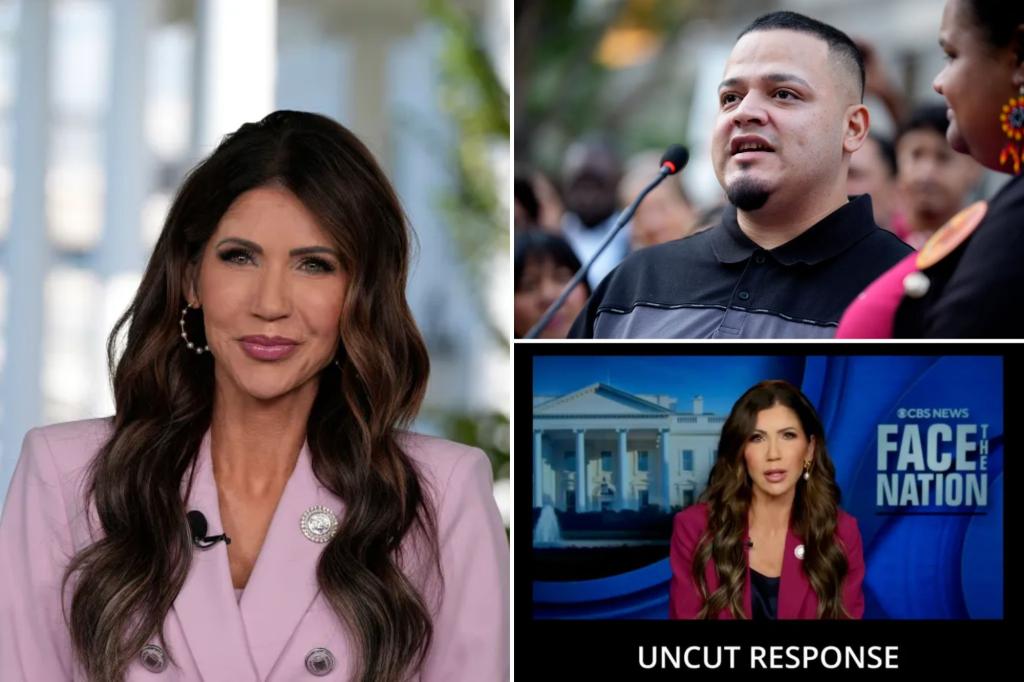Homeland Security Secretary’s Clash with CBS News Over MS-13 Gang Member Interview
In a heated confrontation that highlights the ongoing tensions between government officials and media outlets, Homeland Security Secretary Kristi Noem publicly criticized CBS News for allegedly editing her interview on “Face the Nation” about Kilmar Abrego Garcia, a controversial deportee. Noem took to social media platform X to express her frustration, claiming that CBS had “shamefully edited the interview to whitewash the truth” about the alleged MS-13 gang member. According to Noem, significant portions of her description of Abrego Garcia were removed from the broadcast, including her characterization of him as “a known human smuggler, a MS-13 gang member, a wife beater,” and someone who allegedly solicited nude photos from minors. This editing decision, in Noem’s view, omitted crucial context about why the Trump administration considered him a threat to public safety, sparking a debate about media representation of immigration enforcement issues.
The case of Kilmar Abrego Garcia sits at the intersection of immigration policy, national security concerns, and humanitarian considerations that have divided American politics. In 2019, a federal immigration judge ruled that Abrego Garcia could not be deported to El Salvador due to threats he would face from local gangs, creating a legal protection that temporarily prevented his removal. However, earlier this year, the Trump administration included him among hundreds of alleged gang members deported to El Salvador’s notorious megaprison CECOT. The administration based this decision on a determination made during the 2019 court proceeding that identified him as a member of MS-13, which the United States has designated as a foreign terrorist organization. This designation carries significant weight in immigration proceedings and was central to the government’s justification for his deportation, despite consistent denials from Abrego Garcia and his legal team that he has any gang affiliation whatsoever.
The controversial deportation drew attention from Democratic lawmakers who visited Abrego Garcia in El Salvador and advocated for what they described as his “wrongful” removal from the United States. After being held first at the high-security CECOT prison and later at a lower-security facility, Abrego Garcia was eventually returned to the United States in June, where he faced human smuggling charges. His case became even more complex when he was briefly released before his trial, only to be rearrested by Immigration and Customs Enforcement (ICE) on August 25. The back-and-forth between detention, release, and re-detention illustrates the complicated and sometimes inconsistent application of immigration enforcement policies, particularly in cases where individuals have pending asylum claims or face criminal charges. This procedural complexity has fueled debates about due process in immigration proceedings and raised questions about the criteria used to determine who poses a genuine threat to public safety.
Abrego Garcia now faces a particularly unusual immigration predicament: the possibility of deportation to Uganda, a country with which he appears to have no connection. This unusual circumstance arose after he declined a plea deal for the smuggling charges that would have resulted in his deportation to Costa Rica instead. The consideration of multiple third-country deportation options highlights the intricate diplomatic and legal frameworks that govern immigration enforcement when direct deportation to an individual’s country of origin is legally prohibited due to credible fear claims. Meanwhile, his legal team continues pursuing asylum protection in the United States, a path that could potentially lead to permanent residency and eventually citizenship if successful. His first asylum application in 2019 was denied, but a successful second attempt would dramatically alter his legal status and future prospects, transforming him from a deportation target to a lawful permanent resident on track for citizenship.
The public dispute between Secretary Noem and CBS News reflects broader tensions about how immigration enforcement stories are covered in American media. Noem’s accusation that the network deliberately omitted details that would portray Abrego Garcia in a more negative light touches on recurring conservative criticisms that mainstream media downplays criminal allegations against immigrants. For their part, news organizations must balance reporting accusations against individuals with the presumption of innocence and avoid reinforcing stereotypes about immigrant communities. The editing decisions made by news producers—determining which portions of interviews to air within time constraints—inevitably shape public understanding of complex policy issues. When these editorial choices become the subject of controversy themselves, they reveal the challenging media environment in which immigration policy is discussed and debated, where even the presentation of basic facts can become politically contentious.
This case exemplifies the profound complexity of modern immigration enforcement, where a single individual’s circumstances can involve multiple countries, competing legal claims, allegations of serious criminality, humanitarian protection concerns, and political advocacy from both sides of the aisle. Abrego Garcia’s journey through the American immigration system—from asylum seeker to deportee to criminal defendant to potential asylee again—reflects the labyrinthine nature of immigration law and policy. The intense focus on his case by high-ranking government officials, including the Secretary of Homeland Security, demonstrates how individual immigration cases can become proxies for broader political debates about border security, humanitarian obligations, and national identity. Regardless of the ultimate outcome of Abrego Garcia’s legal proceedings, his case has already become emblematic of the deeply polarized discourse surrounding immigration enforcement in the United States, where questions about who deserves protection and who poses a threat remain fiercely contested.


